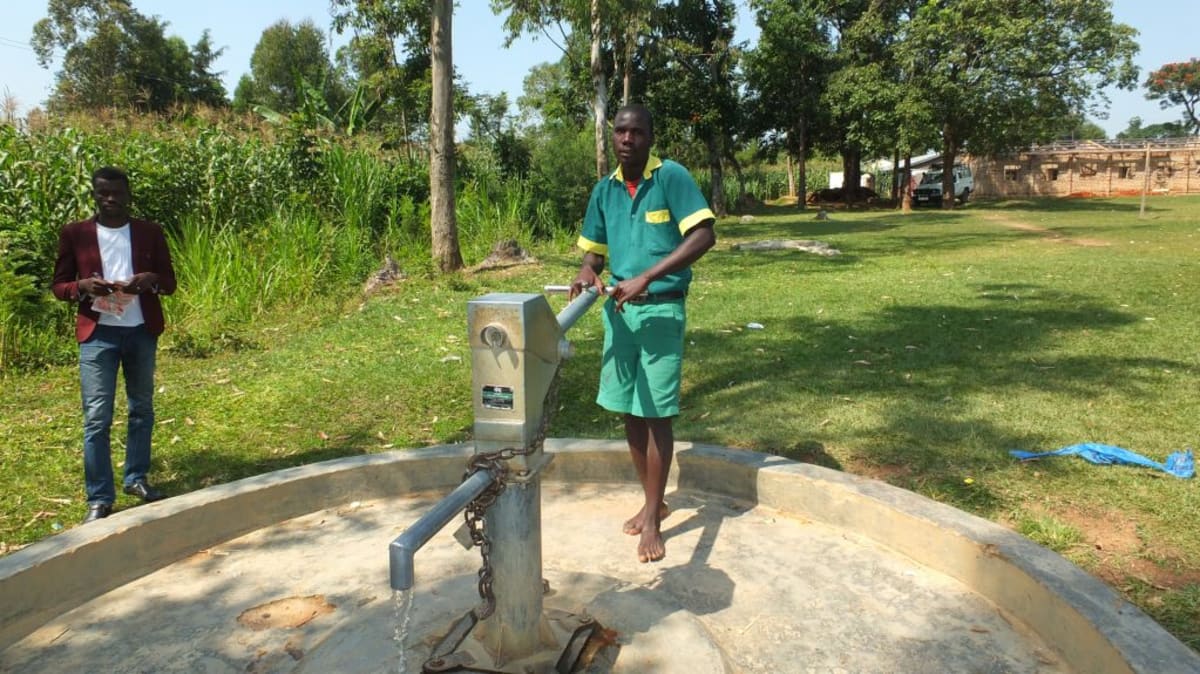This project is a part of our shared program with Safe Water and Sustainable Hygiene Initiative (SAWASHI). Our team is pleased to directly share the below report (edited for clarity, as needed).
Welcome to the School
Lukala Primary School is a public day school started with the sponsorship of Friends Church Quakers. In the year 1969, the school began with 380 pupils and eight teachers. Friends Church Quakers saw the needs of children, and aimed to educate them for a brighter future. The school is located right in the center of Lukala Community, and most of its pupils come from within the community.
Pupils report to their classrooms early in the morning at six for predatory studies. They then break from studies to clean the school compound at 7:30am. This is when groups can be seen crowded at the hand-dug well to fetch water for cleaning latrines and kitchen use. A lot of time is spent at their single water source.
There is a lunch program for the grade eight, preschool classes and teachers. The school also has extracurricular activities like ballgames, music festivals, and other athletics. Lukala Primary School offers classes for handicapped children living within the community. With all these programs, the enrollment of Lukala Primary has grown. As of this year, 580 students attend, out of which 276 are boys and 304 are girls. The school now employs 18 teachers and two supplementary staff. (Editor’s Note: While this many people may have access on any given day, realistically a single water source can only support a population of 350-500 people. This school and their community would be a good candidate for a second project in the future so adequate water is available. To learn more, click here.)
Water Situation
Kenya Finland Company installed a hand-dug well within the school compound in 1992. School leadership attests that the well has a high water level that never ceases to serve students and staff. However, the well pump wore down to disrepair. The pump has since been removed, opening the well to contamination from surface runoff and other contaminants. The well pad has also worn down, so the entire system has been decommissioned. This is the well slated for rehabilitation.
There is another unprotected hand-dug well nearby. There is a well pad covering the hole, but it is without a pump. Students must instead access water through a hatch, lowering a bucket tied to rope to fetch water. Being unprotected, this well is also open to contamination from a myriad of sources. The students bring their own cups and jerrycans, pouring water from the well's bucket to fill their own. When we witnessed this for ourselves, it was obvious that the water isn't clean. Not only that, but the containers students use to fetch water are not clean. This second well does not have the quantity of water that the first one has. During the dry seasons, students can't rely on the well and must instead carry water from home to school. Thus drinking water comes from multiple unknown sources, containers are not clean, and water is not treated. Diarrhea constantly affects students and staff. When suffering from an illness, education comes second.
Sanitation Situation
There are 12 pit latrines, all made of concrete and cleaned by students every morning. However, many of the stalls do not have doors. There is one hand-washing station available for teachers, and garbage is dumped at the edge of school grounds by a maize plantation. You can see these conditions under the "See Photos & Video" tab. The biggest issue here is the lack of opportunity for students to wash hands after using latrines and before eating. The school has initiative, apparent through their daily cleaning rituals. Environment hygiene is important, but personal hygiene has been overlooked. Teacher Neddy Lumuli says, "Cases of diarrhea in children has affected the academic studies of the pupils in this school, since the number of pupils being absent for treatment is high." Without proper hygiene, these germs are spreading like wildfire.
Plans: Hygiene and Sanitation Training
Teachers and students will be trained for two days at the school compound. The facilitator will use the CHAST (Children’s Hygiene and Sanitation Training) method to help students discern between good and bad hygiene habits. Students will be taught how disease is spread at home and at school, and how to prevent this. An entire session will be devoted to teaching students when to wash hands and how to do it properly.
Plans: Hand-Washing Stations
Two hand-washing stations will be delivered to the school so that students can wash their hands after using the latrine and before eating. The school will make sure that these are filled with water and that a cleaning agent is always available.
Plans: Well Rehabilitation
We plan to reconstruct the well that Kenya Finland Company installed in 1992 so that it can again serve the school. This well has a total depth of 13.3 meters and a static water level of 3.4 meters.
The rehabilitation process will include material collection, pad reconstruction, flushing, test pumping, water quality testing, water treatment, and then pump installation. The new pump will be an AfriDev, since it is easy for student to use and parts for repair are easily acquired.
School administration has expressed its concern about the upcoming rehabilitation project. During our visit, the headteacher explained all the reasons why the water system failed in the first place. Some of the reasons are their lack of a water user committee, poor capacity-building strategies, and a lack of ownership by the community. The headteacher will start a program that will bring the school and community together to discuss this and prevent any possible failure. The community and school have promised to form a strong water user committee that will be in charge of operations and maintenance of the rehabilitated well, ensuring that this water will meet the needs of generations to come.

 Protected Dug Well
Protected Dug Well






















